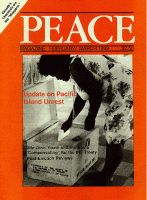
Peace Magazine Feb-Mar 1989, page 16. Some rights reserved.
Search for other articles by Patra Dounoukos here
Recently Phil Esmonde, editor of Tok Blong SPPF, a newsletter published by the South Pacific People's Federation of Canada, spoke in Toronto about the effects of American and French militarization upon the people of the South Pacific. This article looks at three areas he observed there, and the problems which go unnoticed by the rest of the world, given the islands' isolation and the lack of media interest in them.
The Republic of Palau (also known as Belau) is strategically important to the United States. Belau, a part of Micronesia 200 miles east of the Philippines, comprises over 100 islands. It has the world's first nuclear-free Constitution, which was adopted in 1979. Since that time, the people of Belau have had to vote nine times on whether to overrule a clause of the Constitution which bars all nuclear, chemical and biological substances used for warfare. At least 75 per cent of the voters' approval would be required to change the Constitution by referendum.
Since 1947, Belau has formed part of the United Nations Trust Territory of the Pacific Islands. However, as of 1951, the Trust Territory has been the responsibility of the U.S. Department of the Interior; over 90 per cent of its budget comes from the U.S.
Phil Esmonde reports that the Belauns have been offered $450 million if they will pass the Compact of Free Agreement (COFA), which requires them to drop their clause of no nuclear weapons. The American military machine wants to use Belau for three purposes: one third of the land for a jungle warfare training centre; a deep water harbor, possibly for the forward staging of Trident subs; and also for an airstrip and storage area. For accepting these options, the 15,000 Belauns would receive $450 million.
The stress and tension are wearing the islanders down. Violence and bloodshed are common, not to mention cultural and social disintegration. In fact, since Belau has turned the United States down nine times, the first of the islands' two presidents was assassinated, despite the fact that murder is unheard of in Belau culture and guns are outlawed by the Constitution. The second president, Lazarus Selii, was shot in the head by a 357 magnum last August. Murder or suicide? The official autopsy said suicide.
Belau's future relationship with the U.S. is still up in the air. One key to Belau's future, according to Esmonde, is its woman leaders. Belau is a matrilineal society with women chiefs holding power. Although the official government is American-style majority rule, the traditional system still retains some power, and the women oppose changing the constitution.
New Caledonia is about 1,000 miles from Australia. The island has been a French colony since 1958 and, like the other areas held by the French, suffers the effects of France's ongoing militarization. It has a very strategic element, the world's third largest nickel reserve. And its native people, the Kanaks, are waging a struggle for independence.
Last May, 23 people were killed - slaughtered, some say - by the French. Kanaks were holding 23 people hostage, when French troops stormed the cave where they were hidden. Eight hours later, two Frenchmen and 19 Kanaks were dead. Some insurrectionists were reportedly killed after surrendering. Kanak leader Yeiwene Yeiwene, said their bodies were "unrecognizable, their faces riddled with bullets." No hostages were harmed.
Since then, talks between Prime Minister Michel Rocard (France), Jean-Marie Tjibaou, leader of The Kanak Socialist National Liberation Front (FLNKS), and anti-independence leader, Jacques LaFleur, have resulted in the Matignon Accord.
Under the Accord, New Caledonia will have 12 months of direct rule from Paris and then nine years of federalism, during which time New Caledonia will be divided into three autonomous provinces. Two of the provinces will be controlled by the Kanaks, and also will receive more funding than the other province. Come 1998, New Caledonia will vote on independence.
There's been disagreement within the Kanak independence movement, about whether to accept the accord. The younger generation of Kanaks, says Esmonde, want to see the independence vote much sooner.
However, all those involved agree that the accord is a highly positive step: it has lowered tensions in New Caledonia, which was on the verge of civil war. But peace will depend on how the agreement is implemented and whether it will make the Kanaks dependent upon France. If it does so, the relationship will resemble that of Belau and the U.S. - a dependency so strong that the islanders will have to vote to stay, in 1998, since any other vote would be suicidal.
Fiji has had two coups within two years: the first was May 14, 1987, when the Labour Party government of Dr. Timoci Bavadra was overthrown. Bavadra had Fiji Indians in his government.
At present, Fiji is under the thumb of Major-General Sitiveni Rabuka, commander of Fiji Military Forces and apparently a racist. Under Rabuka, common Fijians have lost a great deal; Amnesty International has even alleged torture.
Since the recent political upheavals, many Indians have left the island, including such intelligent professional people as the governor of the bank of Fiji. Many highly skilled people continue to leave.
Rabuka introduced a racist Constitution last September. He warned Fiji that if the Constitution was not accepted by the people, then one of two things could happen: deposed Prime Minister Bavadra could be asked to lead a new government (which Esmonde doesn't believe); or the military would take over again. Esmonde calls this a subtle threat by Rabuka to induce Fijians to support a Constitution that institutionalizes racism by giving more seats to Fijians than Indians, and which prevents Fijians from voting for Indian seats or vice versa. The political situation remains volatile in Fiji, with tensions seething below a quiet surface.

Peace Magazine Feb-Mar 1989, page 16. Some rights reserved.
Search for other articles by Patra Dounoukos here